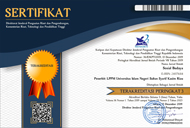The Challenges of ASEAN Economic Community (AEC) in Sharia-Based Small and Medium Enterprises (SMEs) from The Social Capital Aspects
Abstract
Keywords
Full Text:
PDFReferences
Burt, R. S. (2000). The network structure of social capital. (Unpublished working paper). In Science (Vol. 22).
Easmon, R. B., Kastner, A. N. A., Blankson, C., & Mahmoud, M. A. (2019). Social capital and export performance of SMEs in Ghana: the role of firm capabilities. African Journal of Economic and Management Studies, 10(3), 262–285. https://doi.org/10.1108/AJEMS-11-2018-0361
Eravia, D., Handayani, T., & Julina. (2015). The Opportunities and Threats of Small and Medium Enterprises in Pekanbaru: Comparison between SMEs in Food and Restaurant Industries. Procedia - Social and Behavioral Sciences, 169(August 2014), 88–97. https://doi.org/10.1016/j.sbspro.2015.01.289
Erselcan, F., Kutlar, a, Erdem, E., & Doganoglu, F. (2009). Social Capital and Economic Performance of SME’s: A Case Study from Turkey. Proceedings of the European Conference on Intellectual Capital, (Boschma), 191–199.
Ghazinoory, S., Bitaab, A., & Lohrasbi, A. (2014). Social capital and national innovation system: A cross-country analysis. Cross Cultural Management, 21(4), 453–475. https://doi.org/10.1108/CCM-10-2013-0154
Hasbullah, J. (2006). Social Capital (Menuju Keunggulan Budaya Manusia Indonesia). Jakarta: MR United Press.
Huggins, R., Johnston, A., & Thompson, P. (2012). Network Capital, Social Capital and Knowledge Flow: How the Nature of Inter-organizational Networks Impacts on Innovation. Industry and Innovation, 19(3), 203–232. https://doi.org/10.1080/13662716.2012.669615
Indonesia, P. R. Undang-Undang No 9 Tahun 1995. , (1995).
Jan, A., Marimuthu, M., Shad, M. K., ur-Rehman, H., Zahid, M., & Jan, A. A. (2019). Bankruptcy profile of the Islamic and conventional banks in Malaysia: a post-crisis period analysis. Economic Change and Restructuring, 52(1), 67–87. https://doi.org/10.1007/s10644-017-9220-7
Juniasih, I. A. K., Widnyana, D. I. W., Ambarawati, I. G. A. A., & Darmawan, D. P. (2019). The Effects of Social Capital on Performance of Coffee-Based Agribusiness Smes in Tabanan Regency, Bali Province, Indonesia. The International Journal of Social Sciences and Humanities Invention, 6(6), 5513–5520. https://doi.org/10.18535/ijsshi/v6i6.05
Lefebvre, V. M., Sorenson, D., Henchion, M., & Gellynck, X. (2016). Social capital and knowledge sharing performance of learning networks. International Journal of Information Management, 36(4), 570–579. https://doi.org/10.1016/j.ijinfomgt.2015.11.008
Macerinsiene, I., & Aleknaviciute, G. (2011). the Evaluation of Social Capital Benefits: Enterprise Level. Business, Management and Education, 9(1), 109–126. https://doi.org/10.3846/bme.2011.08
Marimuthu, M., Arokiasamy, L., & Islamil, M. (2009). Humanan Capital Development and Its Impact on Firm Performance: Evidence From Developmental Economics. Journal of International Social Research, 2(8). Retrieved from http://scholar.google.com/scholar?hl=en&btnG=Search&q=intitle:No+Title#0
Nurhabibilah, I., Nurhasanah, N., & Eprianti, N. (2018). Pengaruh Pendampingan Program PUSPA terhadap Minat UMKM Syariah dalam Pengajuan Pembiayaan ke Perbankan Syariah. Hukum Ekonomi Syariah, 4(2), 457–463.
Phua, J., Jin, S. V., & Kim, J. (Jay). (2017). Uses and gratifications of social networking sites for bridging and bonding social capital: A comparison of Facebook, Twitter, Instagram, and Snapchat. Computers in Human Behavior, 72, 115–122. https://doi.org/10.1016/j.chb.2017.02.041
Prasad, S., Tata, J., & Guo, X. (2012). Sustaining small businesses in the United States in times of recession: Role of supply networks and social capital. Journal of Advances in Management Research, 9(1), 8–28. https://doi.org/10.1108/09727981211225626
R. Pinho, J. (2011). Social capital and dynamic capabilities in international performance of SMEs. Journal of Strategy and Management, 4(4), 404–421. https://doi.org/10.1108/17554251111181034
Rengkung, L. R., Pangemanan, L. R. j., & Sondak, L. W. (2017). Competitiveness of Small and Medium Firms (SMEs) in Facing ASEAN Economic Community. International Research Journal of Business Studies, 10(2), 123–133. https://doi.org/10.21632/irjbs.10.2.123-133
Roger Goddard. (2003). Relational Networks, Social Trust, and Norms: A Social Capital Perspective on Students’ Chances of Academic Success. Educational Evaluation and Policy Analysis, 25(1), 59–74. Retrieved from https://doi.org/10.3102/01623737025001059
Sani, H., & Mohd-khan, S. J. (2016). Effect of social capital, loan and saving on the growth of SMEs in Nigeria: A proposed research framework. 3rd Annual ECoFI Symposium, (December), 978–983.
Sugiyono. (2014). Metode Penelitian Kuantitatif Kualitatif dan R&D. Bandung: Alfabeta.
Uphoff, N. (2006). Understanding Social Capital: Learning from the Analysis and Experience of Participation. Institutional Analysis.
Yanah, Nakhwatunnisa, H., & Sukarno, T. A. (2018). Strategy to Increase the Competitiveness of SME’s Entreprises. JEJAK: Jurnal Ekonomi Dan Kebijakan, 11(1), 138–150. https://doi.org/10.15294/jejak.v11i1.11705
Yuni. (2016). Peranan Perbankan dalam menghadapi Pasar bebas Asean. Retrieved from http://yunaynay.blogspot.co.id/2015/03/makalah-peranan-perbankan-dalam.html
DOI: http://dx.doi.org/10.24014/sb.v18i2.16130
Refbacks
- There are currently no refbacks.
Published by:
Center for Research and Community Development
Universitas Islam Negeri Sultan Syarif Kasim Riau
Jl. H. R. Soebrantas KM 15,5 ,Tuah Madani, Tampan,
Pekanbaru, Riau 28293
Indexed By:


.jpg)



